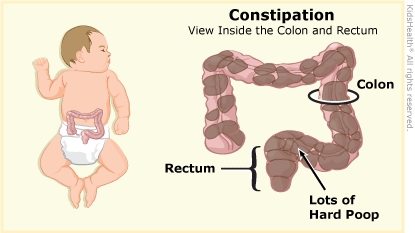Constipation: Caring for Your Infant
Constipation means having fewer bowel movements (poops) than usual, or having dry poops, or hard poops. Constipation in babies usually gets better with fruit juices and foods with fiber, like puréed fruits and vegetables and whole-grain cereals. Follow your health care provider's advice on how to treat your baby's constipation.


-
You can give your baby apple, prune, or pear juice each day:
-
For babies younger than 4 months, ask your health care provider how much is OK.
-
For babies older than 4 months, give 2 to 4 ounces each day.
-
If you bottle-feed your baby, you can mix the juice with your baby's usual formula or breast milk.
-
Use 100% fruit juice. Don't use fruit juice with added sugar.
-
If your baby has started solid foods, try foods that are high in fiber, such as:
-
Follow your health care provider's directions for how much formula or breast milk your baby should drink each day.
-
If your baby is straining to pass a bowel movement, you can help by:
-
Do not give your baby:
-
laxatives (medicine taken by mouth that helps "push" out the poop)
-
a suppository (medicine put into the rectum to soften the poop) unless the health care provider says it's OK
-
an enema (liquid that's put into the rectum to help the poop come out)
-
Do not put anything in your baby's rectum to try to remove the poop.
-
Do not give your baby mineral oil. It can get in your baby's lungs and cause a serious type of pneumonia.

Your baby:
-
doesn't poop for 2 days after you've made changes in your baby's diet
-
has blood on the poop or in the diaper
-
doesn't want to eat or starts to throw up
-
gets better, then gets constipated again
-
takes longer than 10 minutes to have a bowel movement
-
seems to be in pain while having a bowel movement
-
has a swollen belly
-
is crying much more than normal or seems to be in a lot of pain

How do babies get constipated? Babies can get constipated when they:
Do babies need to poop every day? No, it's normal for some babies to not poop every day. Breastfed babies can sometimes go a week or more between poops. Even if a baby strains or doesn't poop every day, if the poop is soft, the baby probably isn't constipated.